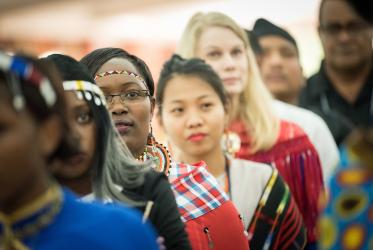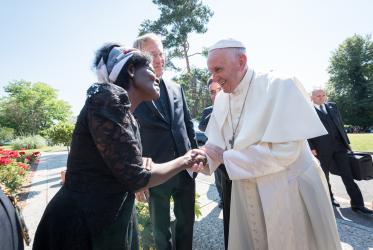What else could your family, your parish, your community do to respond to the needs of migrants and refugees arriving in your country?
Representatives of many different churches met in Rome in September to discuss that practical question, as well as respond to the broader challenge of how people of faith can combat the rising tide of racism, xenophobia and nationalist policies that increasingly target vulnerable migrants and asylum seekers.
The three-day conference, which concluded with a papal audience on September 20, was jointly organized by the World Council of Churches and the Vatican’s Office for Integral Human Development, in cooperation with the Pontifical Council for the Promotion of Christian Unity.
In a concluding message, conference participants stressed that migration is a feature of the human condition and that Christians are called to “welcome the stranger”, standing up for the rights and dignity of all people.
Speakers at the conference highlighted many examples of how churches are already accompanying migrants and helping them to integrate into their host communities.
Alessandra Santopadre, who coordinates welcome, sponsorship and support programmes in the Catholic diocese of Montreal, Canada, explained how many parishes are sponsoring refugees through an agreement with the Quebec Government. Host families take legal and financial responsibility for the new arrivals, providing for housing, food and clothes, as well as helping adults find work and children enroll in school.
A lot of her work involves awareness raising about the needs of migrant families, as well as the responsibilities of host families. It doesn’t just mean “open the door” and provide practical assistance, she explained, but it also means understanding the difficult situations of war and persecution from which they have escaped.
Many refugees, she noted, feel guilty that they are safe, while other family members are not, so often they need psychological support as well. Creating bonds of trust “between families and parishes needs time”, she stressed, so it’s important not to rush into asking too many personal questions before they are ready to respond.
In 2017, she said, most of the migrants on the sponsorship programme had fled from the war in Syria, but the diocese also supports refugees from Iran, Iraq, Afghanistan, Congo, Ethiopia, Eritrea and Burundi.
Many institutions in Quebec, Santopadre said, have racist attitudes towards immigrants, as was clearly shown in a recent university research project that sent off identical CVs to prove that only those with Canadian and French names are considered for employment, while those with foreign surnames are rejected. Migrant families also have difficulties finding apartments as landlords often find excuses not to rent to foreigners.
Santopadre and her colleagues also support seasonal agricultural workers from Mexico and Guatemala who are often badly exploited by farmers. They are forced to work long hours for poor pay in dangerous conditions, handling pesticides or other toxic chemicals that can harm their health. With the visas they have, she explained, they cannot work for a different employer, so if anything happens to them they are afraid to complain for fear they will be sent back to their home country.
Santopadre works with Spanish speaking volunteers to visit the farms, building relationships with the workers so that they feel confident to talk about their needs and problems. Slowly, we are making changes, she said, showing that the church can make a real difference to the lives of these marginalized people.










